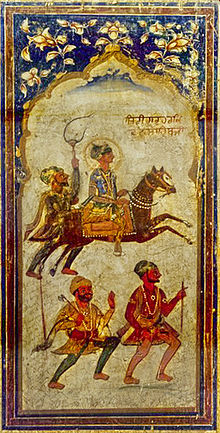Guru Harkrishan
| Guru Harkrishan | |
|---|---|

A fresco of Guru Har Krishan ca. 1745
|
|
| Religion | Sikhism |
| Other names | The Eighth Master, |
| Personal | |
| Born | Har Krishan July 7, 1656 Kiratpur, Sivalik Hills, Mughal Empire (Present day India) |
| Died |
March 30, 1664 (aged 7) Delhi, Mughal Empire (Present day India) |
| Spouse | 0 |
| Children | 0 |
| Parents | Guru Har Rai and Mata Krishen |
| Religious career | |
| Predecessor | Guru Har Rai |
| Successor | Guru Tegh Bahadur |
Guru Har Krishan ([ɡʊru həɾ kɾɪʃən]; 7 July 1656 – 30 March 1664) revered as the eighth Nanak, was the eighth of ten Gurus of the Sikh religion. At the age of 5, he became the youngest Guru in Sikhism on 7 October 1661, succeeding his father, Guru Har Rai. He contracted smallpox and died of the disease in 1664 before reaching his 8th birthday.
He is also known as Bal Guru (Child Guru), and sometimes spelled in Sikh literature as Hari Krishan. He is remembered in the Sikh tradition for saying "Baba Bakale" before he died, which Sikhs interpreted to identify his granduncle Guru Tegh Bahadur as the next successor. Guru Har Krishan had the shortest tenure as Guru, lasting only 2 years, 5 months and 24 days.
Earlier it was believed that Guru Har Krishan Sahib was born in Keeratpur (Sivalik Hills) in northwest Indian subcontinent to Mata Sulakhni and Guru Har Rai ji. But , as per book Dabistan-i-Mazahib (written in 1660) Guru Har Rai spent 13 years (1644 to 1657) at Thapalpur (then Nahan State); hence Guru Harkrishan was born in 1652 at Thapalpur, old Nahan State, now (Lohgarh Zone), Haryana .
His father, Guru Har Rai ji supported the moderate Sufi influenced Dara Shikoh instead of conservative Sunni influenced Aurangzeb as the two brothers entered into a war of succession to the Mughal Empire throne. After Aurangzeb won the succession war in 1658, he summoned Guru Har Rai in 1660 to explain his support for the executed Dara Shikoh. Guru Har Rai sent his elder son Ram Rai to represent him. Aurangzeb kept the 13 year old Ram Rai as hostage, questioned Ram Rai about a verse in the Adi Granth – the holy text of Sikhs. Aurangzeb claimed that it disparaged the Muslims. Ram Rai changed the verse to appease Aurangzeb instead of standing by the Sikh scripture, an act for which Guru Har Rai excommunicated his elder son, and nominated the younger Har Krishan to succeed as the next Guru of Sikhism.
...
Wikipedia
